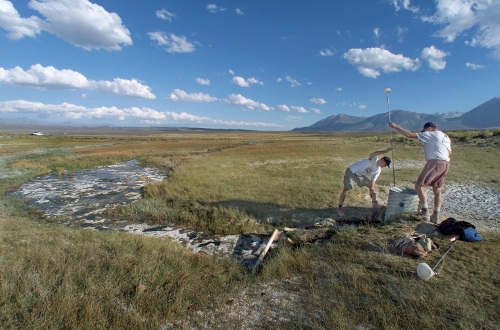
BERKELEY – Federal stimulus funds have been awarded to the Lawrence Berkeley National Laboratory to study and advance enhanced geothermal systems (EGS) technology.
Lawrence Berkeley National Laboratory, which is a US Department of Energy national laboratory, reported that it received $7 million in American Recovery and Reinvestment Act funding for four projects that seek to advance EGS technology, which involves enhancing or engineering a fracture network deep in the earth.
Mack Kennedy, a geochemist and manager of Lawrence Berkeley Lab’s geothermal program, told Lake County News that the projects all will be conducted in the lab.
EGS technology makes it possible to get heat from deep inside the earth in cases where conventional geothermal technologies – which generally must be near active volcanic centers or have very high temperature gradients – don't work, the laboratory reported.
Considered a clean and green technology that has the added benefit of being available around the clock and at any time of year, increased focus is being placed on geothermal production nationwide.
The Department of Energy reported that geothermal energy currently provides less than 1 percent of total U.S. electricity and 8 percent of renewable electricity generation.
The agency believes EGS could increase geothermal production 40-fold – increasing production to provide 10 percent of the United States' electricity needs.
The $7 million award for the Lawrence Berkeley National Laboratory is part of a $400 million investment that the Department of Energy has made in geothermal energy thanks to the Recovery Act.
In The Geysers steamfield in Lake and Sonoma counties, Calpine is using the enhanced technology, according to a statement made to Lake County News this summer by Dennis Gilles, Calpine's senior vice president of renewables growth.
In Calpine's case, it involves injecting water into existing cracks in the bedrock and using the resulting steam to power the geothermal facility.
Over the summer, AltaRock Energy had begun drilling on an enhanced geothermal systems project above Anderson Springs. That project, which proposed to actually create new fractures in order to put water into them, appears to now be on hold due to problems with drilling, as Lake County News has reported.
Kennedy said the goal is to find ways to expand the geothermal resource base.
The four projects are as follows:
– Fluid imaging ($1.95 million): Underground fluid manipulation, necessary to enhance permeability, is critical to making EGS successful manipulation of fluids underground to enhance permeability. Scientists haven't been able to reliably predict how fluid moves, its locations and concentrations several kilometers below the surface. This project seeks will use geophysical data from sources such as seismic and electromagnetic surveys to create better fluid imaging, which can minimize the cost associated with drilling additional wells.
– Estimating fracture surface area ($1.95 million): Scientists will use natural chemical and isotopic tracers to estimate changes in fracture surface area induced by well stimulation. The lab noted that understanding the surface area and permeability of the rock’s fracture network is important in determining the capacity and longevity of EGS systems.
– Thermal-hydrological-mechanical-chemical (THMC) modeling ($1.74 million): Scientists will seek to develop a model using rock mechanics, chemistry and fluid flow to develop a tool that will allow for more effective strategies for heat extraction and reservoir sustainability.
– CO2 as fluid: ($1.32 million): Instead of using water to transmit heat, the project will look at using carbon dioxide, which theoretical studies suggest could extract heat from fracture rock at about 50 percent higher rates than water. This project is a collaboration with Idaho National Laboratory.
Officials noted that most of these technologies also will be of use in evaluating conventional geothermal reservoirs.
Kennedy said the research is intended to help predict, guide and manage the impacts of stimulation in geothermal systems.
“It's both to make it safe and efficient,” he said.
Understanding the physical aspects of underground fractures also is critical to advancing geothermal. “We don't really have any good ways of doing that,” which Kennedy said is a major reason for the research.
“That would have far-reaching implications beyond heat exchange,” and would help with managing geothermal and other energy production fields – including oil and gas, Kennedy said.
Some of the projects also will try to determine if there's a way of predicting a resource's longevity.
The fourth project, which looks at using carbon dioxide as a heat exchange medium, is very promising on paper, said Kennedy.
“There's a lot of just fundamental science about CO2 and that kind of environment that we don't understand,” he said.
The idea was first presented at a conference at Stanford University. Kennedy said it has a lot of potential advantages, including sequestration. He called it a double-edged sword, but a good one.
Visit the lab's EGS Web site at http://esd.lbl.gov/research/projects/induced_seismicity/egs/ .
E-mail Elizabeth Larson at This email address is being protected from spambots. You need JavaScript enabled to view it. . Follow Lake County News on Twitter at http://twitter.com/LakeCoNews and on Facebook at http://www.facebook.com/pages/Lake-County-News/143156775604?ref=mf .

 How to resolve AdBlock issue?
How to resolve AdBlock issue? 





